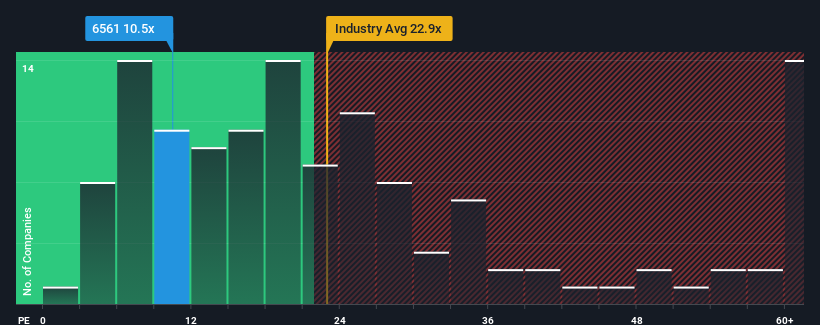- Japan
- /
- Hospitality
- /
- TSE:6561
Hanatour Japan Co., Ltd. (TSE:6561) Looks Inexpensive After Falling 34% But Perhaps Not Attractive Enough

The Hanatour Japan Co., Ltd. (TSE:6561) share price has fared very poorly over the last month, falling by a substantial 34%. The drop over the last 30 days has capped off a tough year for shareholders, with the share price down 47% in that time.
In spite of the heavy fall in price, Hanatour Japan's price-to-earnings (or "P/E") ratio of 10.5x might still make it look like a buy right now compared to the market in Japan, where around half of the companies have P/E ratios above 14x and even P/E's above 21x are quite common. Nonetheless, we'd need to dig a little deeper to determine if there is a rational basis for the reduced P/E.
With earnings growth that's exceedingly strong of late, Hanatour Japan has been doing very well. One possibility is that the P/E is low because investors think this strong earnings growth might actually underperform the broader market in the near future. If that doesn't eventuate, then existing shareholders have reason to be quite optimistic about the future direction of the share price.
Check out our latest analysis for Hanatour Japan

How Is Hanatour Japan's Growth Trending?
The only time you'd be truly comfortable seeing a P/E as low as Hanatour Japan's is when the company's growth is on track to lag the market.
Taking a look back first, we see that the company grew earnings per share by an impressive 380% last year. Still, EPS has barely risen at all from three years ago in total, which is not ideal. Accordingly, shareholders probably wouldn't have been overly satisfied with the unstable medium-term growth rates.
Comparing that to the market, which is predicted to deliver 9.8% growth in the next 12 months, the company's momentum is weaker based on recent medium-term annualised earnings results.
In light of this, it's understandable that Hanatour Japan's P/E sits below the majority of other companies. It seems most investors are expecting to see the recent limited growth rates continue into the future and are only willing to pay a reduced amount for the stock.
What We Can Learn From Hanatour Japan's P/E?
Hanatour Japan's P/E has taken a tumble along with its share price. We'd say the price-to-earnings ratio's power isn't primarily as a valuation instrument but rather to gauge current investor sentiment and future expectations.
We've established that Hanatour Japan maintains its low P/E on the weakness of its recent three-year growth being lower than the wider market forecast, as expected. Right now shareholders are accepting the low P/E as they concede future earnings probably won't provide any pleasant surprises. If recent medium-term earnings trends continue, it's hard to see the share price rising strongly in the near future under these circumstances.
You need to take note of risks, for example - Hanatour Japan has 2 warning signs (and 1 which is significant) we think you should know about.
You might be able to find a better investment than Hanatour Japan. If you want a selection of possible candidates, check out this free list of interesting companies that trade on a low P/E (but have proven they can grow earnings).
Valuation is complex, but we're here to simplify it.
Discover if Hanatour Japan might be undervalued or overvalued with our detailed analysis, featuring fair value estimates, potential risks, dividends, insider trades, and its financial condition.
Access Free AnalysisHave feedback on this article? Concerned about the content? Get in touch with us directly. Alternatively, email editorial-team (at) simplywallst.com.
This article by Simply Wall St is general in nature. We provide commentary based on historical data and analyst forecasts only using an unbiased methodology and our articles are not intended to be financial advice. It does not constitute a recommendation to buy or sell any stock, and does not take account of your objectives, or your financial situation. We aim to bring you long-term focused analysis driven by fundamental data. Note that our analysis may not factor in the latest price-sensitive company announcements or qualitative material. Simply Wall St has no position in any stocks mentioned.
Have feedback on this article? Concerned about the content? Get in touch with us directly. Alternatively, email editorial-team@simplywallst.com
About TSE:6561
Hanatour Japan
Operates as a travel portal company in Japan and internationally.
Excellent balance sheet and good value.
Market Insights
Community Narratives



